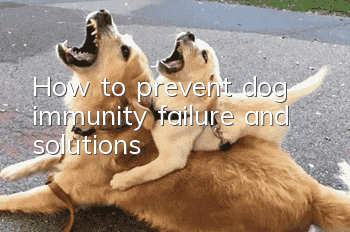How to prevent dog immunity failure and solutions

1. Reasons for dog immune failure
1. Genetic factors
The immune response of the animal body to vaccination is controlled to a certain extent by genetic factors. There are many breeds of dogs, and the immune responses are different. Even dogs of different breeds and different individuals have different immune responses to the same vaccine. Some dogs may even have congenital immune deficiencies, leading to immune failure.
Irish Red and White Setter
2. Interference from maternal antibodies
This is one of the most common factors for immune failure. A certain level of maternal antibodies is extremely important for protecting puppies from early infection with infectious diseases. However, due to differences in the individual immune responses of breeding dogs and the differences in vaccines used in breeding dogs (there are also large differences in the induced maternal antibody titers), the levels of maternal antibodies in puppies from different sources are uneven. If all puppies are vaccinated at the same age, puppies with too high maternal antibodies may interfere with the immune response of the vaccine, while puppies with too low maternal antibodies may be latent for infectious diseases when vaccinated. infectious period, resulting in immune failure. Even the maternal antibody titers among different individuals of puppies from the same female dog are not necessarily exactly the same. If a fixed first vaccination procedure is used, it will also interfere with the immune response of the vaccine, leading to immune failure.
3. Reasons for vaccines
Using vaccines produced by informal biological products factories, the quality of vaccines is unqualified or of poor quality; using expired vaccines; low temperature conditions cannot be guaranteed during the transportation and storage of vaccines, which will reduce the vaccine titer; after the vaccine is taken out, it must be subject to Direct sunlight exposure or taking out the vaccine for too long resulted in reduced vaccine activity; the freeze-dried vaccine was not diluted with a special diluent, and the vaccine was not used up within the specified time after dilution, resulting in a greatly reduced stability of the vaccine; inadequate vaccination, vaccination Inaccurate doses, etc., can affect the potency and immune effect of the vaccine, and even lead to immune failure.
4. Immunization program
Establishing a scientific and reasonable vaccination program is an important link in the implementation of effective epidemic prevention work. It is very important for the dog population to achieve and maintain a high level of immunity and obtain good immune protection. Only with reasonable immunization procedures can effective vaccines produce good immune effects. The content of the immunization program includes vaccine type, age for first vaccination, number of vaccinations, vaccination interval, etc. Factors such as local epidemic and disease status, dog usage, feeding and management conditions, maternal antibody levels and vaccine quality should be taken into consideration when formulating the vaccination program. Among them, the level of maternal antibodies is the most important. If exemptedUnreasonable design of vaccination program, too early or too late first vaccination, too long or too short interval between two vaccinations, too many or too few vaccinations, etc. will affect the immune effect of the vaccine and lead to failure.
5. Nutritional factors
Antigens enter the body and produce different levels of immune responses - cellular immunity and humoral immunity, both of which require certain nutrients. Lack or insufficiency of nutrients, especially vitamins A, D, B, E and various trace elements and full-price proteins, will affect the production speed or quantity of immune antibodies, leading to lag in immune response or immune response ability. decline, leading to immune failure.
6. Latent infection
When dogs are vaccinated, they may already be in the incubation period of the disease, or have severe parasitic infections. At this time, dogs often become ill within a short period of time after being vaccinated. Before the entire immunization program is completed, young susceptible animals grow in a virus-contaminated environment and are prone to infection and disease.
7. Stress
The immune function of the animal body is regulated by nerves, body fluids and endocrine to a certain extent. It is under the influence of stress factors such as climate fusion (overcooling and overheating), excessive humidity, poor ventilation, noise, sudden changes in the environment, and sudden changes in feed. , the body's secretion of adrenal cortical hormones increases, which can significantly damage T lymphocytes, inhibit macrophages, and increase the catabolism of IgG. Therefore, vaccination when the dog is in a sensitive period for stress response will weaken the dog's immunity, leading to immune failure. This is why newly bought puppies are particularly susceptible to illness.
2. Solutions to dog immune failure
1. Strengthen nutritional supplements
Strengthen feeding management, feed full-priced dog food, pay attention to protein nutrition supply, adapt to supplement vitamins and various trace elements, reduce various stress factors, reasonably deworm, enhance physical fitness, and improve the dog's resistance and immunity to diseases. .
2. Rational use of drugs
According to the nature and symptoms of the disease, as well as the severity of the disease, drugs should be selected scientifically and rationally to avoid indiscriminate use and abuse of drugs. It is best not to use disinfectants, antibiotics, anti-coccidial drugs and antiviral drugs within a few days before and after vaccination. Reasonably choose to use immune promoters such as levamisole, BCG, and interferon to enhance the immune effect. Use glucocorticoids, cytotoxic drugs and sex hormones with caution to avoid harming immune organs and immune cells and affecting immune response.
Try not to go to small pet storesWhen your dog is vaccinated, try to choose a regular and certified animal hospital. The doctors there will first inquire about the dog’s recent diet, excretion, mental state, etc., and then conduct basic examinations such as measuring body temperature, After checking the condition of the visible mucous membrane, etc., and making sure that the dog meets the standards for vaccination, a scientific and reasonable vaccination program will be formulated. The doctor will also explain the precautions after the vaccination is completed.
- What is the hard lump on the dog's neck?
- The correct way to bathe a Cocker Spaniel
- What are the symptoms of arthritis in dogs?
- What should I do if my golden retriever eats too much and has diarrhea?
- When was the first time the dog was dewormed?
- How to treat cataracts in dog eyes
- Why do dogs turn green?
- What can’t a dog eat when pregnant?
- Why should male dogs be sterilized? What should we pay attention to when neutering dogs?
- Why do dogs guard their food? How to solve the problem of dogs guarding their food?



